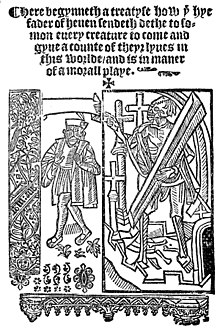| Everyman | |
|---|---|
 Frontispiece from edition of Everyman published by John Skot c. 1530. | |
| Written by | unknown; anonymous translation of Elckerlijc, by Petrus Dorlandus |
| Characters | |
| Date premiered | c. 1510 |
| Original language | Middle English |
| Subject | Reckoning, Salvation |
| Genre | Morality play |
The Somonyng of Everyman (The Summoning of Everyman), usually referred to simply as Everyman, is a late 15th-century morality play by an anonymous English author, printed circa 1530. It is possibly a translation of the Dutch play Elckerlijc (Everyman).
Like John Bunyan's 1678 Christian novel The Pilgrim's Progress, Everyman uses allegorical characters to examine the question of Christian salvation and explain that Man must have a relationship with God to attain it. To develop that relationship, his strength, wisdom, senses, beauty and discretion is not helpful. The relationship with God is strengthened through his adherence to rules established by the Church – the partaking of the Eucharist, confession, penance, and participation in last rites, thus redeeming him and preparing him for eternal salvation.